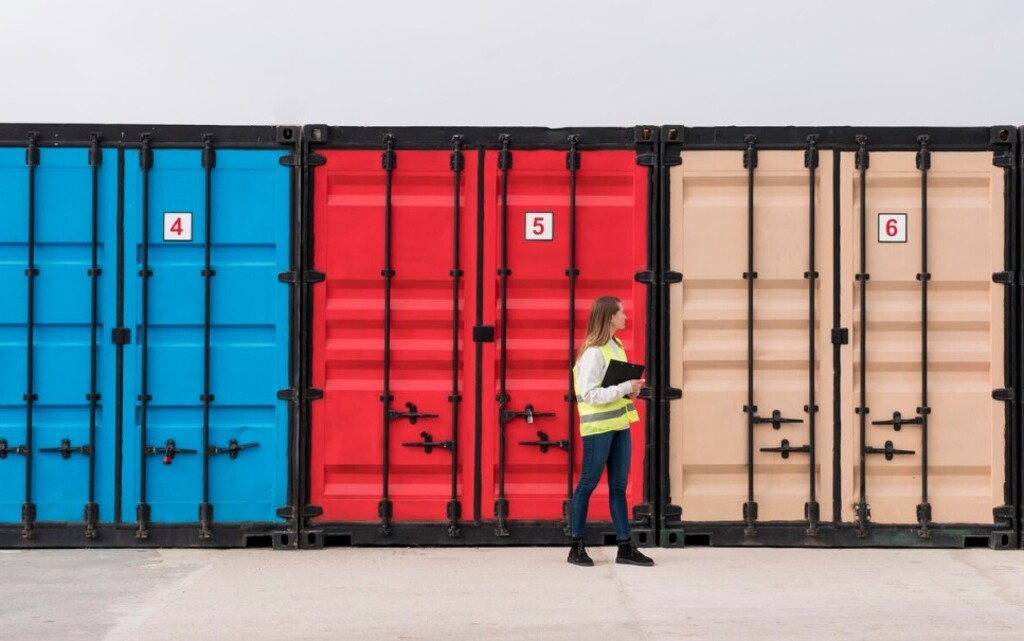Heavy duty shipping container locks are specialized locking systems designed to secure containers against forced entry, theft, and unauthorized access. They are especially used in high-risk or long-term storage environments.
They go far beyond basic padlocks and seals by offering increased physical resistance, tamper protection, and in some cases, remote monitoring.
With their robust and reinforced design, they can handle extreme weight, harsh environments, and high-security applications.
If you’re looking for heavy-duty shipping container locks, here’s a breakdown of the top options that you can choose from:
Contents
Heavy Duty Shipping Container
A shipping container is considered heavy duty and needs these types of locks when:
- Has a thicker corten or reinforced steel structure to resist impacts, warping, or break-ins.
- Designed to hold extremely heavy machinery or cargo (e.g.,>30,000 kg).
- Improved locking gear and welds to prevent forced entry or door flex.
- Extra sealing or rust-proofing for outdoor or coastal use.
It’s typically an upgraded or custom-built version of a standard ISO container, made with thicker steel, stronger floors, and additional structural or security features. The common uses for heavy-duty containers are:
- Industrial Equipment Storage
Store heavy machinery, tools, or spare parts at construction sites, factories, or mines. - Military or Government Use
Designed to withstand transport stress, tampering, and environmental extremes. - Secure Data or Weapon Storage
Used for high-value or sensitive items needing strong tamper resistance. - Off-Grid or Harsh Environments
For oil fields, deserts, or polar locations where regular containers might fail. - Heavy Freight Shipping
For oversized, over-mass cargo that exceeds standard container tolerances.
Types of Heavy-Duty Shipping Container Locks

1. Smart & Internal High-Security Systems
One of the great types of smart & internal high-security systems is the Seguratainer Locks. They provide a cutting-edge family of heavy-duty, smart shipping container locks, built to withstand professional-level attacks while offering advanced access control.
They offer mobile access via NFC, audit trails, and strong resistance to professional attacks – each tested to handle multiple locking points and up to 9 tons of pressure.
The Seguratainer Locks consist of:
- Slam Lock (internal): Concealed within the container – virtually invisible and tamper-proof.
- Claw Lock (external): Portable, durable, and quick to install – “revolutionary” locking mechanism.
- Ratchet Lock (external): Manually adjusted, tool-free installation in under 10 seconds.
- Lock Box Lock (external): All-in-one lock with up to 9 tons of resistance.
2. Traditional High-Security Padlocks
Traditional high-security padlocks offer impressive strength and durability. They have hardened steel, stainless steel, or brass structure, often featuring shrouded shackles, anti-drill plates, and double-ball locking mechanisms.
These designs resist bolt cutters, picking, drilling, and prying. High-grade padlocks often come with corrosion-resistant coatings and sealed mechanisms, making them suitable for harsh outdoor environments.
Here are some top-rated traditional high‑security padlocks ideal for heavy-duty shipping containers, based on the latest expert reviews and real-world user feedback:
- Abloy PL 358: Features a rotating disk cylinder and hardened steel, making it extremely resistant to picking.
- Sargent & Greenleaf 951C: Heavy-duty steel body with hardened shackle and steel inserts to thwart physical attacks, designed with high security in mind.
- Abus 83/80 S2: Solid hardened steel body and shackle; interchangeable core allows flexible re-keying.
- Abus 20/70 Diskus: Stainless steel, disc-style body with 360° enclosed shackle for maximum resistance against bolt cutters, offering high pick resistance and strong overall durability.
3. Lock Boxes & Padlock Shields
Lock Boxes and Padlock Shields are a very good security upgrade for heavy-duty shipping containers. However, their effectiveness depends on how they’re used, what they’re paired with, and what kind of threats you’re protecting against.
A lock box is welded or bolted over your existing padlock to make it inaccessible to bolt cutters and grinders, great for outdoor or long-term security.
A padlock is often defeated by bolt cutters or angle grinders. A lock box (a padlock shroud or padlock cover) is welded or bolted onto the container to hide the shackle of the padlock.
This makes it extremely hard to access with bolt cutters, resistant to prying or drilling, and much more time-consuming to defeat.
4. Crossbar Locks
Crossbar locks (also known as container bar locks, cargo bar locks, or locking arms) are excellent for securing heavy-duty shipping containers. In many cases, they provide stronger physical security than padlocks alone.
Unlike padlocks that secure only the locking handles or latches, crossbar locks span both container doors, physically prevent the doors from opening, and also act as a steel barrier, not just a lock
This offers a more complete form of protection, especially against prying or brute-force attacks.
They have a hardened steel structure, often 10-12 mm thick or more. Some are rated to withstand over 5-10 tons of force. This is ideal for shipping operators and remote job sites.
5. Traditional Padlocks & Seals
- Abus Granit / Abus Diskus and Master Lock Magnum: Reliable, weatherproof, and rated for high-cut resistance.
- Bolt Seals: ISO 17712 compliant single-use seals, primarily for tamper-evident security during transit—not strong physical barriers.
Traditional padlocks and seals can be part of a shipping container’s security. They are inexpensive, widely available, easy to install, and available in high-security variants.
However, it will not work alone for serious, heavy-duty protection – especially against professional thieves or in high-risk environments. You will need seals to complete the task. The purposes of seals are:
- Evidence of tampering – not true security
- Used in international shipping to show if the container was opened in transit
- Required for customs clearance, such as ISO 17712-rated bolt seals
Conclusion
Heavy duty shipping container locks offer increased physical resistance, tamper protection, and, in some cases, remote monitoring for your container.
Tradecorp is a reliable shipping container sales, purchase, rental, and modification service company. Tradecorp provides modification and custom shipping container services by adding windows, doors, walls, and roof insulation.
Our experienced staff is ready to help you arrange the shipping of your shipping container to your requested location. Fill out our quote form to buy or rent from us!


